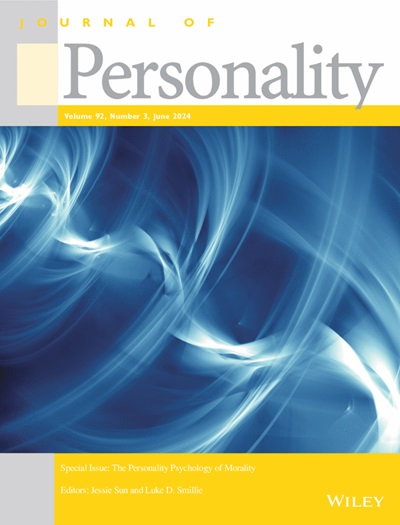Does a Small Country Have Meaningful Regional Personality Differences? The Case of Estonia
IF 2.7
1区 心理学
Q1 Psychology
引用次数: 0
Abstract
BackgroundRegional differences in the Big Five personality domains have been observed in several countries at different geographical granularities, often correlating with regional political, economic, social, and health (PESH) indicators.ObjectiveWe examined the extent of regional personality differences in Estonia and whether these differences were meaningfully correlated with PESH indicators.MethodsUsing data from the Estonian Biobank (一个小国是否存在有意义的地域个性差异?爱沙尼亚案例
在几个不同地理粒度的国家中,已经观察到五大人格领域的区域差异,这些差异通常与区域政治、经济、社会和健康(PESH)指标相关。目的研究爱沙尼亚地区人格差异的程度,以及这些差异是否与PESH指标有意义相关。方法使用爱沙尼亚生物库(N = 72,268;7%的成年人,提供了前所未有的代表性),我们测试了区域人格差异及其与PESH指标的关系,并在有无空间平滑的情况下进行了测试。结果我们发现,不同县(N = 15)的区域大五得分差异为1.19(外向性)至2.78(开放性)T - score单位,不同市(N = 74)的区域大五得分差异为2.80(外向性)至4.74(开放性)单位。此外,即使在控制了性别、年龄和空间依赖关系后,县市两级PESH指标之间的相关性仍然存在,并且与我们的预测(r = 0.23至0.30)以及县市两级之间的相关性(r = 0.41)保持适度一致。结论爱沙尼亚居民的人格特征与其他国家的调查结果一致,与其他国家的调查结果一致。然而,小的区域人格领域差异可能代表有效的,可能是相应的心理差异。
本文章由计算机程序翻译,如有差异,请以英文原文为准。
求助全文
约1分钟内获得全文
求助全文
来源期刊

Journal of Personality
PSYCHOLOGY, SOCIAL-
CiteScore
9.60
自引率
6.00%
发文量
100
期刊介绍:
Journal of Personality publishes scientific investigations in the field of personality. It focuses particularly on personality and behavior dynamics, personality development, and individual differences in the cognitive, affective, and interpersonal domains. The journal reflects and stimulates interest in the growth of new theoretical and methodological approaches in personality psychology.
 求助内容:
求助内容: 应助结果提醒方式:
应助结果提醒方式:


